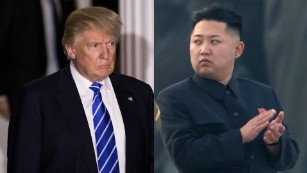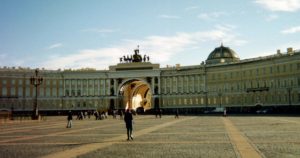According to a poll released last Friday, 80% of Americans are worried at the escalating militaristic rhetoric with North Korea. CommonDreams reports on the Axios poll:
Commissioned by Vote Vets, a left-leaning political action group which advocates on behalf of U.S. veterans, the poll shows that Americans are both paying attention to—and increasingly worried about—the tensions stirred by President Donald Trump’s bluster and threats towards North Korea and fears that Pyongyang may itself try to launch a nuclear attack.

The new poll arrives after Trump on Thursday said maybe his recent threats to bring down “fire and fury” against North Korea were not “tough” enough and ahead of upcoming (and large-scale) U.S.-South Korean war games which foreign policy analysts warn will only exacerbate tensions.
For its part, China has announced its position in terms of intervening in any conflict: if North Korea acts first, it will be on its own; however, if Washington attacks North Korea, China will step in on behalf of the isolated country. According to Newsweek:
China will remain neutral if North Korea fires missiles at United States territory first, but should the U.S. launch a pre-emptive strike, as it has suggested it might, North Korea’s chief ally would come to the North’s aide. While not direct government policy, that verdict of how the country should react amid the unfolding nuclear threats from the U.S. and North Korea is contained in an editorial in the influential Communist Party–run Global Times newspaper Friday.
“China should also make clear that if North Korea launches missiles that threaten U.S. soil first and the U.S. retaliates, China will stay neutral,” read the editorial. “If the U.S. and South Korea carry out strikes and try to overthrow the North Korean regime and change the political pattern of the Korean Peninsula, China will prevent them from doing so.”
As reported by ZeroHedge, China and Russia have come up with a plan to resolve tensions in the Korean peninsula as the Russian Foreign Minister Sergey Lavrov announced recently:
In a glimmer of hope that a military conclusion to the North Korean crisis may yet be averted, Russia’s foreign minister Sergey Lavrov said that “Russia does not accept a North Korea that possesses nuclear weapons”, cautioned that there is an “overwhelming amount of over-the-top belligerent rhetoric on North Korea’s nuclear and rocket programs from Washington and Pyongyang”, but most importantly said that there is a joint Russian-Chinese plan to defuse the North Korean crisis, according to which North Korea would freeze its missile tests, while the US and South Korea would stop large scale exercises.
“Russia together with China developed a plan which proposes ‘double freezing’: Kim Jong-un should freeze nuclear tests and stop launching any types of ballistic missiles, while US and South Korea should freeze large-scale drills which are used as a pretext for the North’s tests.”
It was not clear if Russia or China, had floated this plan with the US or S. Korea prior; the most likely answer is no.Hoping that “common sense will ultimately prevail“, Lavrov said that North Korea had once signed the Non-Proliferation Treaty (NPT) but then withdrew from it. The result is a nuclear-armed N.Korea which Russia refuses to accept: “Now North Korea claims that it has legal rights to make nuclear weapons and has already done so,” he said. “But you know our position: we don’t accept the fact that North Korea could possess nuclear weapons.”
He added that both Russia and China have a “range of proposals” aimed at preventing what could become “one of the deepest conflicts” and a “crisis with a big number of casualties.” (emphasis in original)
Of course, reasonable plans for compromise that North Korea would be willing to accept have been offered to Washington before and rejected. An interview with Noam Chomsky a few months ago discusses this history. So, the chances of such a compromise being accepted by Washington now does not look optimistic, even though South Korea has announced its intentions to go all out to prevent any war with North Korea as it knows the damage it would suffer from any military attack unleashed by the North. The new president of South Korea, who campaigned as a peace candidate, made the following public remarks earlier this week, according to the Economic Times of India.
“There must be no more war on the Korean Peninsula. Whatever ups and downs we face, the North Korean nuclear sitaution must be resolved peacefully,” said Moon in opening remarks at a regular meeting with senior aides and advisers. The remarks were provided by the presidential Blue House.
The following day, Moon made comments in a televised speech, intimating that Washington and South Korea had an understanding that no military action was desired and none would be taken without South Korea’s permission.
Moon, in a televised speech Tuesday on the anniversary of World War II’s end and the Korean Peninsula’s liberation from Japanese colonial rule, said Seoul and Washington agree that the nuclear standoff should “absolutely be solved peacefully.” He said no U.S. military action on the Korean Peninsula could be taken without Seoul’s consent.
Moon said the North could spur talks by stopping nuclear and missile tests.
“Our government will put everything on the line to prevent another war on the Korean Peninsula,” Moon said. “Regardless of whatever twist and turns we could experience, the North Korean nuclear program should absolutely be solved peacefully, and the (South Korean) government and the U.S. government don’t have a different position on this.”
Reportedly, General Joseph Dunford met on Monday with top South Korean security officials and subsequently made comments that don’t seem to totally line up with Moon’s understanding, which seems to be based more on wishful thinking.
For some depressing context as to why North Korea feels the need to defend itself against any possible aggression from Washington, watch the following video where Jimmy Dore discusses how the U.S. military utterly flattened the entire country and killed millions of civilians during the Korean war. The devastation was so massive that General MacArthur said it made him “vomit.” An accomplishment that the DOD still brags about on its twitter account.
https://www.youtube.com/watch?v=8Crf7dubJ3k
And just to add an ironic twist to this whole story, the New York Times has reported that the source of the advanced missiles that have enabled North Korea to make sudden gains in its weapons system is none other than our democracy-loving good buddies in Ukraine. ZeroHedge wrote of the expose:
According to the report, analysts who studied photographs of Kim Jong-un, inspecting the new rocket motors concluded that they derive from designs that once powered the Soviet Union’s missile fleet. “The engines were so powerful that a single missile could hurl 10 thermonuclear warheads between continents.”Since the alleged engines have been linked to only a few former Soviet sites, government investigators and experts have focused their inquiries on a missile factory in Dnipro, Ukraine, on the edge of the territory where Russia is fighting a low-level war to break off part of Ukraine. During the Cold War, the factory made the deadliest missiles in the Soviet arsenal, including the giant SS-18. It remained one of Russia’s primary producers of missiles even after Ukraine gained independence.
**************************************************************************
With North Korea taking up so much attention – attention that was once obsessively focused on Russia – it’s easy to forget about the third country that was the target of the recent sanctions legislation passed by Congress and reluctantly signed by Trump. Iran is none too happy about having new sanctions levied on it – in addition to still having some of the original sanctions that were supposed to be lifted as a result of the agreement with the P5+1 still in place – after holding up its end of the bargain as recently certified by the Trump administration.
Iran’s first announced response, via legislation passed by its parliament (the Majlis), was to put more funding into its ballistic missile systems and its Revolutionary Guards. Alexander Mercouris provides some interesting insight into the nature of these particular sanctions on Iran and how they have huge potential to backfire:
It should be said that the latest US sanctions on Iran – which basically target certain individuals and companies in Iran, and which attempt to block arms to and by Iran – are pinpricks.
The arms blockade on Iran the US is now trying to impose is especially absurd since the only countries which have shown any interest in selling sophisticated arms to Iran are Russia and North Korea, whose arms companies the US is already sanctioning, and which has no reason therefore not to sell arms to Iran.
Unsurprisingly the Russians have reacted to the sanctions – both those imposed on Iran and those imposed on themselves – by offering to step up their arms sales to Iran. Russian Deputy Prime Minister Dmitry Rogozin – the Russian official who supervises Russia’s arms industries – recently visited Iran, where he supposedly offered the Iranians SU-27 and MiG-35 fighters (the Iranians supposedly said no because they want SU-35s and SU-30s instead).
Needless to say if North Korea were ever to offer to sell its ballistic missile and nuclear weapons technology to Iran – as it now has every incentive to do – the development of Iran’s ballistic missiles and – conceivably at some point – nuclear weapons would also accelerate rapidly.
Seriously, who writes this stuff?
An additional response has come from reform president Rouhani, who has staked his political reputation on the negotiated agreement with Washington against domestic hardliners who don’t trust Washington as far as they can sling a piano. In a speech before the Majlis, Rouhani stated that Iran could restart its nuclear program and exit the agreement if any further sanctions were implemented.
**************************************************************************
With all of these antics, would it be a surprise if citizens of the world still believed that the U.S. was the most dangerous nation in the world as was reflected in a WIN/Gallup poll several years back? Well, according to a new survey, not only does the world still think this, even more think it than before. Russia analyst Patrick Armstrong summed up the latest survey findings:
THE THREAT. Pew has an international survey out asking about leading security threats. The following NATO members name US power as a greater threat than Russian or Chinese: Canada, Germany, Greece, Spain and Turkey. USA is named first by 19 countries, China by 9, Russia by 7. This is a competition that the US has won every time out of the gate. And rising. Interesting, eh? And after all that propaganda, too. NATO StratCom needs more money!
**************************************************************************
In a bit of good news, the UN announced that hundreds of thousands of Syrians have returned home to Homs and Aleppo after the cities were liberated from jihadist terrorists earlier this year. Al-Masdar News reported :
BEIRUT, LEBANON (4:40 A.M.) – According to a study by the International Organization for Migration (a United Nations body), some 602,759 displaced Syrians have been returned to their homes of which about two-thirds of that number specifically resettled in Aleppo Governorate.
The period of time the study accounts for is from January to June 2017.
Of the 602,759 returned Syrians, approximately 84 percent were internally displaced and the remaining sixteen percent were displaced in Lebanon, Iraq, Turkey and Jordan.
The study found that two of the biggest regions that had seen the resettlement of displaced Syrians were the provinces of Aleppo and Hama in which 405,420 and 75,209 people (respectively) were returned.Furthermore, regarding Aleppo Governorate, the UN report specified that 97 percent of all returned people actually settled into their original homes. The remaining three percent were said to be renting, living in abandoned households or staying in informal refugee camps.
So if 97% of these people have been able to return to their original homes already, then either the destruction wrought by the Syrian and Russian governments in the battle of Aleppo was greatly exaggerated or there has been a very intense rebuilding program.
Either way, I’m happy for the Syrian people who are going home and will hopefully be able to pick up the pieces of their lives.


